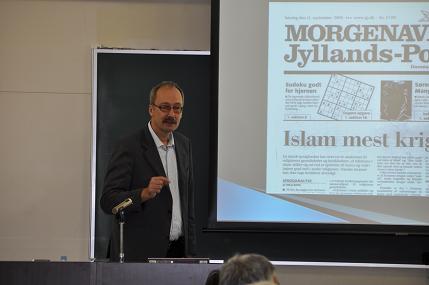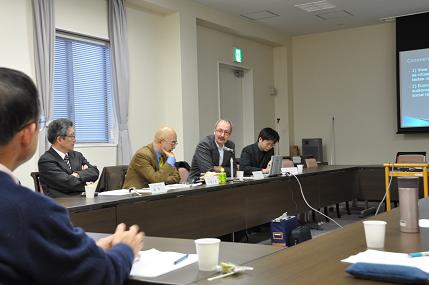Center for Interdisciplinary Study of Monotheistic Religions(CISMOR)Doshisha University
> Public Lectures > The Muhammad Cartoon Conflict and the Danish Politics of Negative DialoguePublic Lectures
Public Lecture by Project 2
The Muhammad Cartoon Conflict and the Danish Politics of Negative Dialogue
| Date: |
2009/12/05 13:00 - 15:00 |
|---|---|
| Place: | Room Z B1, Jinshin-kan B1F, Shinmachi Campus, Doshisha University |
| Lecture: | Peter HERVIK, visiting professor of Hitotsubashi university / CISMOR researcher |
| Summary: | |
|
An anthropologist, Professor Peter Hervik, who conducted in-depth research on the Muhammad cartoon conflict, gave an account of the background to this conflict as follows. Denmark is a small country with a population of 5.5 million people, including 200,000 Muslims, out of whom the number of devout Muslims is estimated at somewhere between 20,000 and 30,000. Under such social circumstances, the majority of people in Denmark seem to think that they are free to say anything about Muslims and other minority groups, including ethnic minorities. In fact, there were cases in the past where parliament members made extreme remarks about Muslims, for example, calling them a “cancer” or a “plague” in Europe. We should be aware that the Muhammad cartoon conflict took place against this backdrop. Opinions vary as to the origin of the conflict. Though the general view is that the conflict stems from the publication of the cartoons by the largest newspaper in Demark, the Jyllands-Posten in September 2005, Professor Hervik maintains that the root of the conflict dates back to the Weimarer era in the 1930s, for the following reason. The publication of the cartoons by the newspaper company was designed to provoke Muslims. This fact is a clear indication of the politicization of today’s Danish journalism. For Danish politics, the watershed year was 2001, when three young Muslims were arrested for having supported extremists, which was soon followed by the 9/11 terrorist attacks and then by the victory of a radical right-wing party in the Danish national election. The new administration then launched a series of measures that could have been termed a “cultural war” against Islam, and the Jyllands-Posten followed such a policy by the government and began to call “Islam” their enemy in place of “communism.” The publication of the cartoons quickly led to protests from Islamic governments, and in several places, to riots by Muslims. In the face of such a situation, the Danish government only said that they had no means of controlling the press because of “freedom of speech.” Western media and researchers supported the stance of the Danish government to respect this “freedom of speech,” and no measures were taken to compromise with the Islamic world. According to Professor Hervik, the network of “neo-conservatives” (in his words, “new conservatives”) was behind such an attitude of the Western world. This view is best represented by Samuel Huntington, who quotes a passage from a novel that “unless we hate what we are not, we cannot love what we are,” and states that enemies are essential, adding that the most potentially dangerous enmities occur across the fault lines between the world’s major civilizations. This notion exactly corresponds to Carl Schmitt’s concept of “friend-enemy distinction,” which served as the foundation of Nazism in the 1930s. It is for this reason that Professor Hervik sees the root of the Muhammad cartoon conflict as being based in the Weimarer era in the 1930s. Another thinker who provides neo-conservatives with ideological grounds to stand on is Leo Strauss. At any rate, negotiation and compromise are not in their vocabulary, as for them, the public sphere is a venue for “battle,” not “dialogue.” Professor Hervik seems to think that we can better cope with the Muhammad cartoon conflict by addressing such a stance by neo-conservatives. Now that neo-conservatives have withdrawn from the political arena and efforts have begun to shed light on their realities, we may say that the time is ripe to verify Professor Hervik’s view in ideological terms. Ryuji Fujimoto (Research Fellow, CISMOR, Doshisha University) |
|
|
*This lecture is given in English, with Japanese consecutive interpretation. *Admission Free,No reservation necessary *Inquiry: 075-251-3972 (CISMOR) |
|
|
Program(Japanese) |
|

